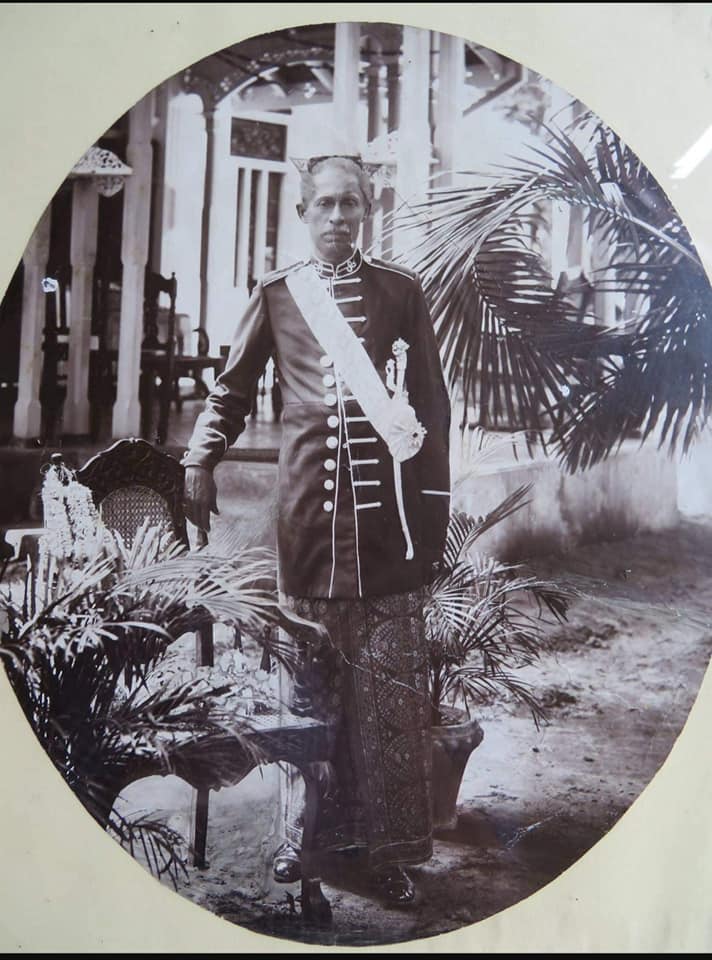
Beminahannedige Manosingho Ralahami, Village headman (Gam Muladani) of Panadura.
Sri
Lanka Sinhala Family Genealogy
BEMINAHENNEDIGE
PEIRIS Family
#3874

Beminahannedige
Manosingho Ralahami, Village headman (Gam Muladani) of
Panadura.
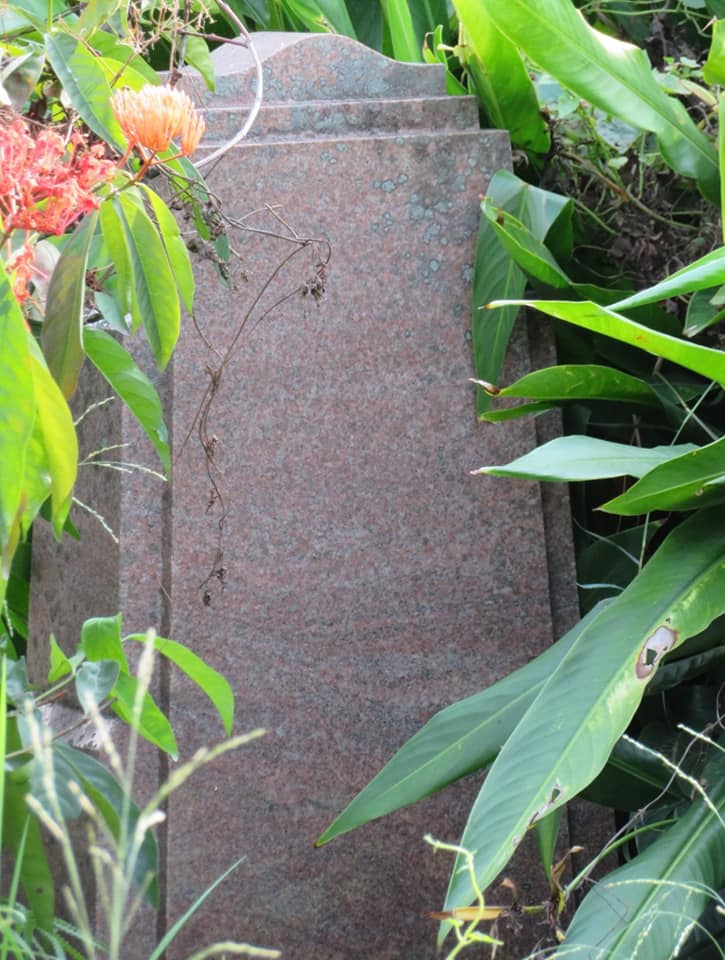
0
Baminahannadige Joseph Peiris,
(d. 1905 ) and Lindamulage Basthiyana Silva. "Siddhi
Sadhana" was originally the residence of Joseph Peiris
1 Beminahennedige Arnold Peiris, d. 1940,
Landed Proprietor of Egoda Uyana + Yasodara
Sudirikku Jayawickrema (1900-57) of
Matara, daughter of Charles Francis
Sudirikku Jayawickrema , Mudaliyar of the District Court,
Kegalle & Caroline Amarasuriya of Galle . Yasodara (Yaso) was one of the many daughters of
Mudaliyar Charles Francis Sudirikku Jayawickrama (12 July 1857
- 26 April 1915) of Matara & Caroline Amarasuriya of
Magalle. Arnold and Yasodara married circa 1920, and had
eleven children.
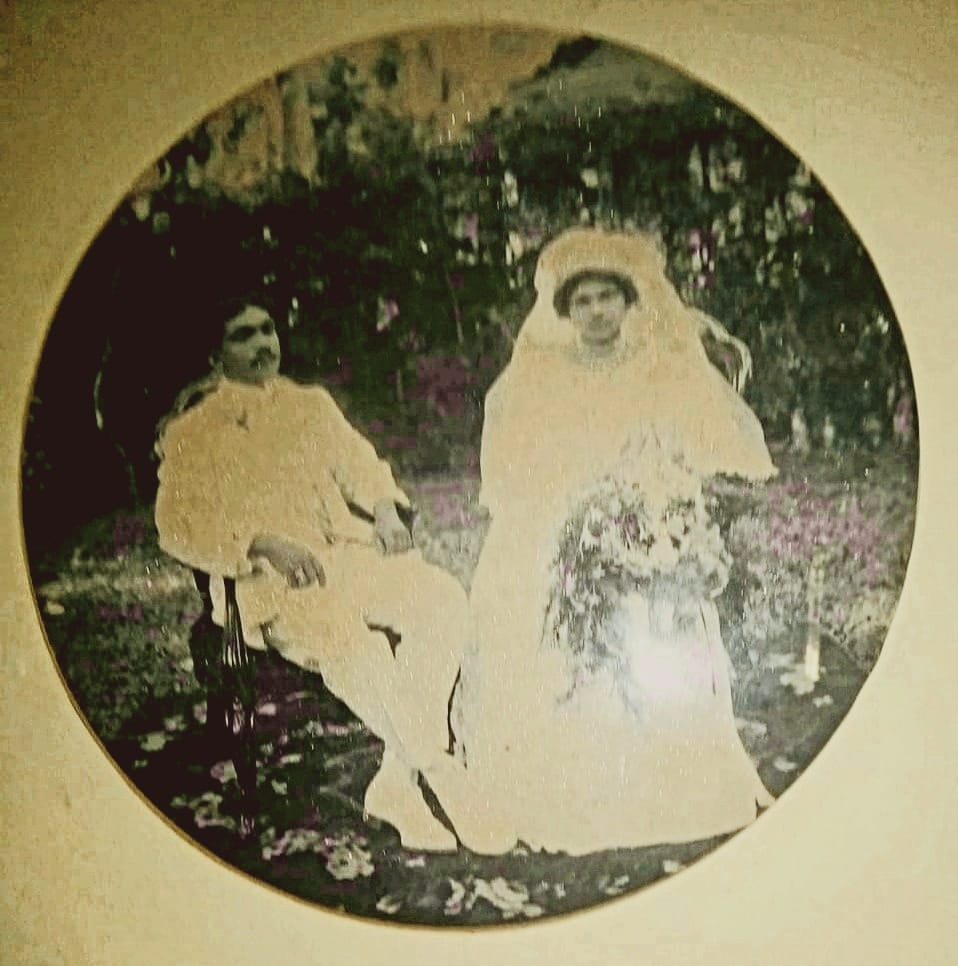 Wedding photo of Baminahannadige
Arnold Peiris of "Siddhi Sadhana", Egoda Uyana, Moratuwa &
Yasodara Sudirikku Jayawickrema of Matara. Photo circa 1920,
Matara.
Wedding photo of Baminahannadige
Arnold Peiris of "Siddhi Sadhana", Egoda Uyana, Moratuwa &
Yasodara Sudirikku Jayawickrema of Matara. Photo circa 1920,
Matara.
(Photo preserved and kindly shared by
B. Dilshan Peiris and Kirthie de Silva).
2.1
Beminahennedige Jinanjali Merlyn Peiris (Govt. Teacher) +
Beminahennedige Dickson Edmund Peiris (Principal , Dummalasuriya
MV 1965-1973)
2.1.1 Gamini
2.1.2 Ranji
2.1.3
Lalitha
2.1.4
Sriyani
2.1.5 Bandu
2.1.6 Susil
(deceased)
2.1.7 Kanthi
2.2 B. Thelma Josephine Peiris + Samson de Mel (United Tractors)
No children
2.3 B. Pabaceili Monica Peiris + .............. Fernando (?)
2.3.1
Bernard
2.3.2 Edward
2.4 B. Dayananda Ratne Bharati Peiris (Irrigation )+ Dolly
......
2.4.1
Dilrukshi
2.4.2
Dilshan
2.5 B. Chandrasiri Ratne Bharti Peiris (Private Sector) +
Beatrice Jayawickrama
2.5.1 ?
2.6 B. Indrawansa Ratne Bharati Peiris (?) + Dotty
........
2.6.1 Frank
2.6.2 Edward
2.7 B. Dhanapala Ratne Bharati Peiris - Died at the age of 20
yrs.
2.8 B. Malini Racheal Peiris + K. Bertie de Silva (ex.
R.A.S.C, Estate Superintendent)
2.8.1 Ajith
2.8.2 Dr.
Shanaka Ph.D (Osaka) & Professor in Japan.
2.8.3 Anil
2.9 B. Padma Lakshmini Peiris + S. Piyasena de Silva (Railways)
2.9.1 Anura
2.9.2
Chandani
2.9.3 Piyal
2.9.4
Devapriya
2.10 B. Amara Chitrani Peiris* + W. A. Walter de Silva
(Pure Beverages)
2.10.1
Suresh
2.10.2
Gayani
http://archives.sundayobserver.lk/2007/05/13/spe05.asp
2.11 B. Amitha Snyani Peiris* + Ranji Peiris (?)
2.11.1
Thushani
* twins
Source : Kirthie de Silva & Dr. Shanaka de Silva
#####################################
The Beminahennedige familes of
Moratuwa and Panadure could be having common ancestors, and also
related to Sethu Gurunnanse who owned hundreds of acres of
ancestral land in Dehiowita. Beminahennediges are a pre-colonial
period "priestly warrior" clan that controlled access to the
interior of the country through the Panadure river and also the
the crossing points.
Surnames had become an essential
convenience in the early 1900 s for legal documentation,
transacting business, dealing with colonial officials etc.
Surnames were also trendy. Therefore many local families made up
for their lack of respectable ancestral names (old ancestral
names that come before the name) by taking impressive Sinhala
surnames such as Dissanayake, Senanayake, Jayawardena
Wijayawardana, Seneviratne etc. at that time. Families that
already had respectable ancestral names too took on surnames at
that time, but they were mostly Iberian surnames such as De
Silva, Fernando, Perera, Pieris etc. Therefore most of those
surnames too are from the early 1900s, and not from the
Portuguese period.
Keeping up with the above trend of
the early 1900s, different branches of the Beminahennedige
family appear to have taken different surnames. For example,
the descendants of Sethu Gurunnanse's
eldest son, Beminahennedige Manosingho Ralahami, go as
Beminahennedige Ratnabharati Fernandos:
#######################################
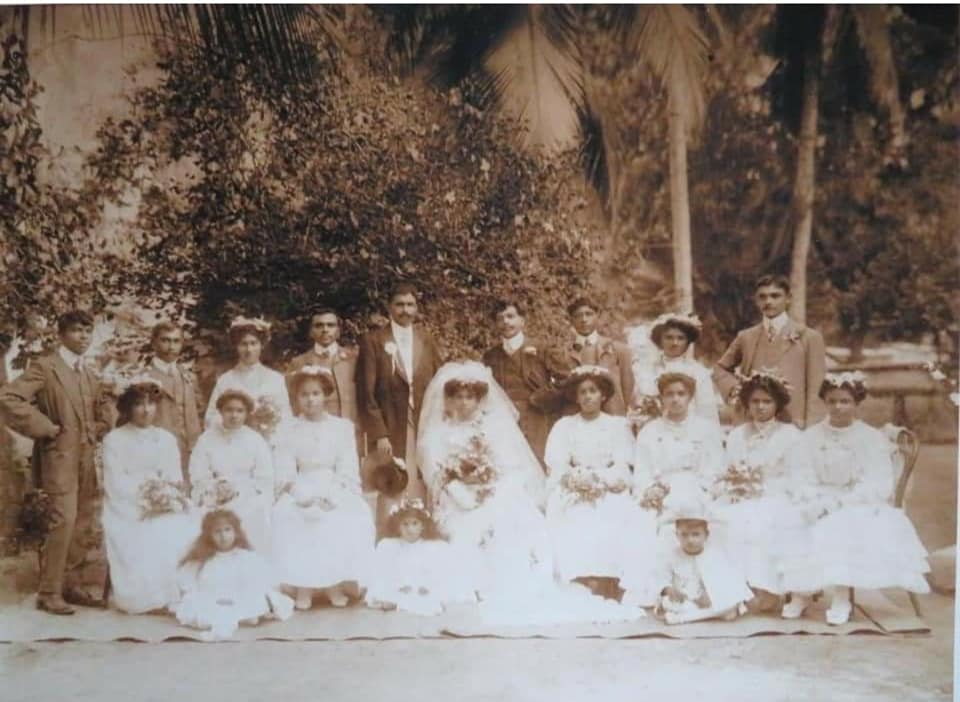
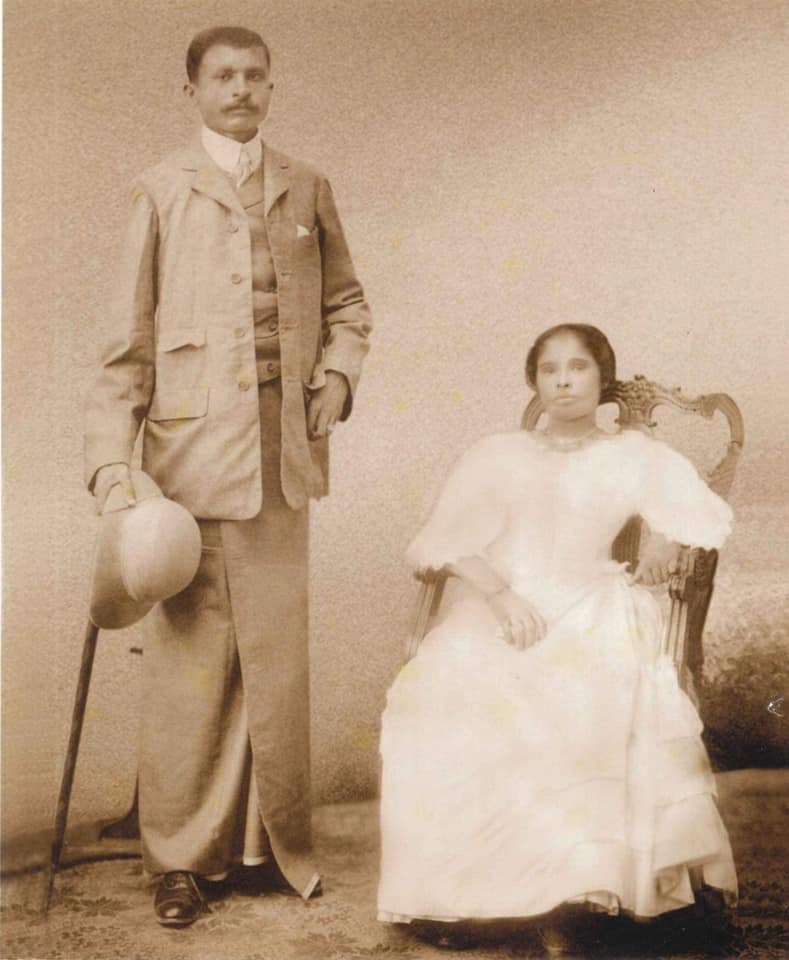
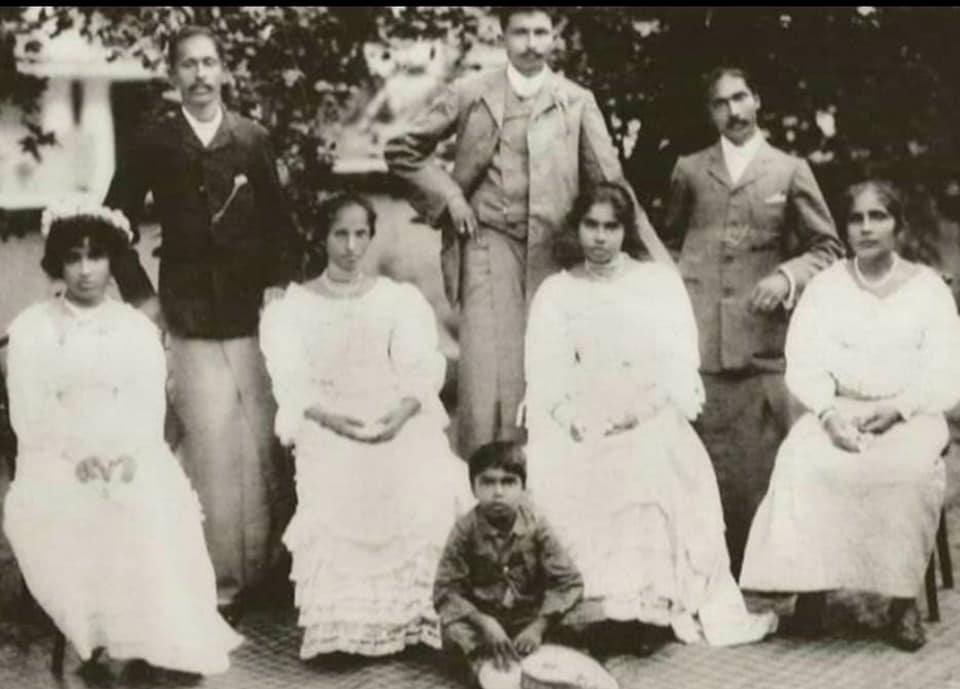
A portrait of a Wattorutantrige
Fernando family from a century agoFrom left to right: Singhi the
younger daughter, son Wattorutantrige
William Fernando and his wife Moira
Aponsu, the son-in-law
Beminahannedige Geemon Fernando (1880
- 1962) and his wife Cecilia (m. circa. 1911, d. 1923) the elder
daughter, another son and the matriarch of the family, Mandadige
Robina Fernando. The youngest son Abraham is on the mat.
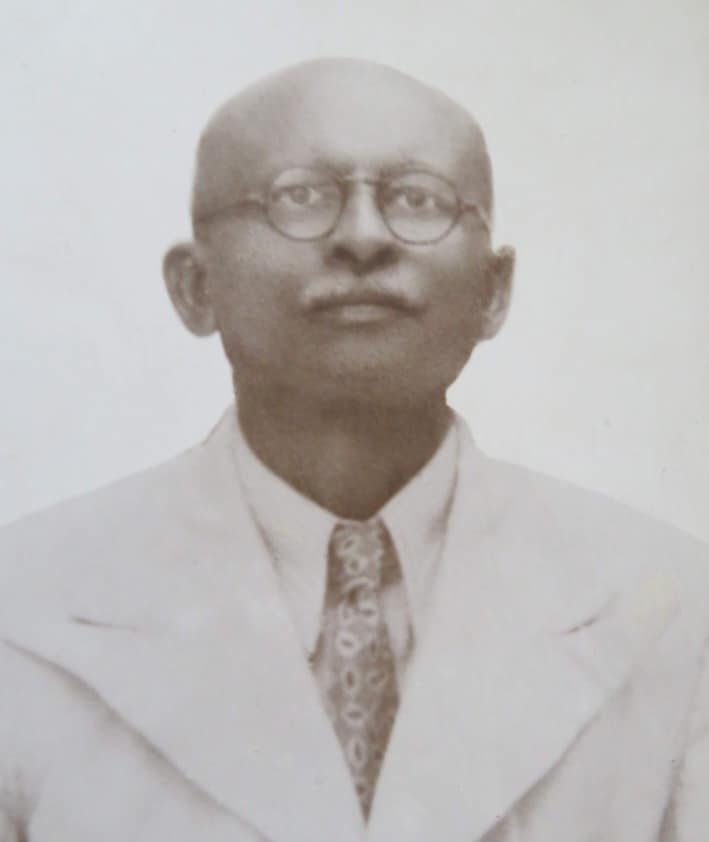
Beminahannedige
Geemon Fernando later in life.
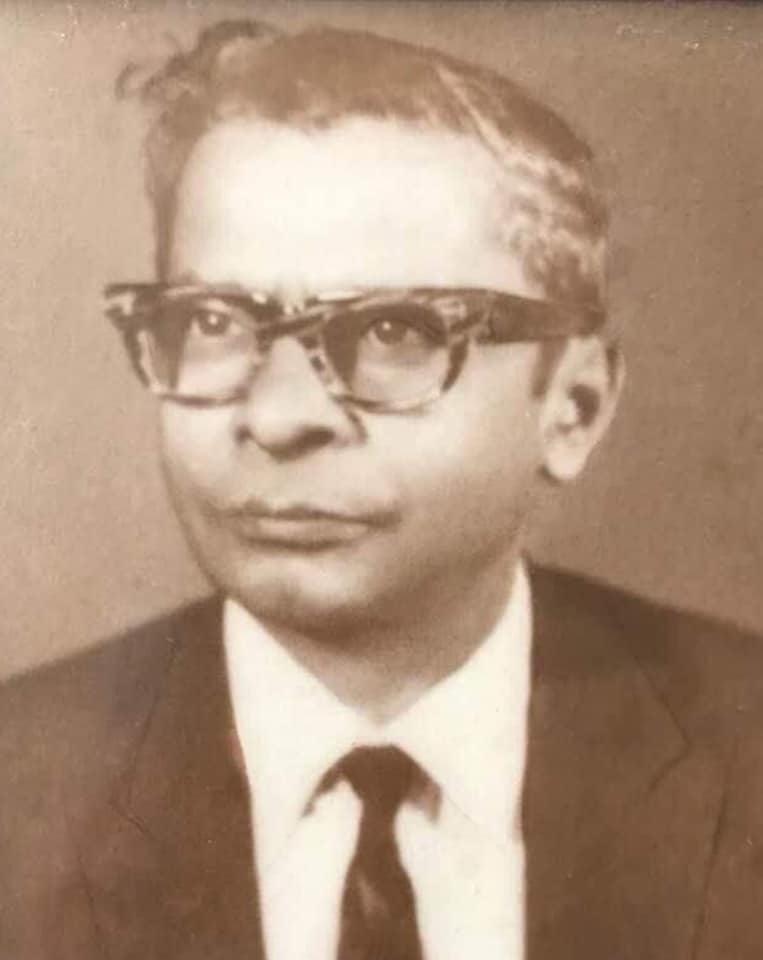
The son,
Ernest Geemon Calister (aka Arthur) Fernando (1916 - 1978).
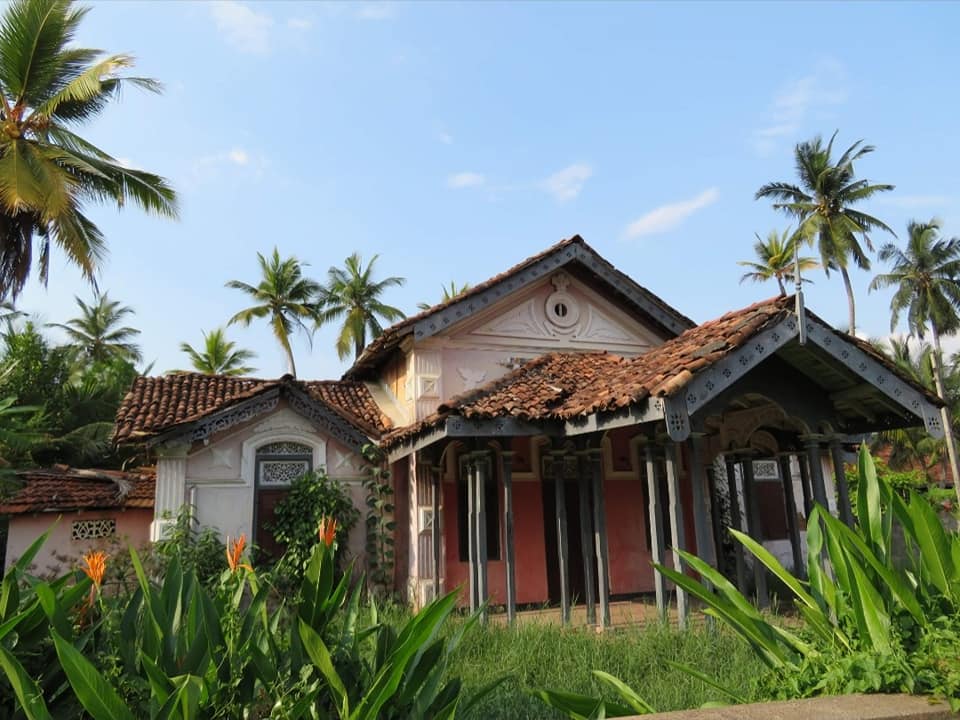
The current
condition of Beminahannedige Manosingho Ralahami's home in
Pallimulla, Panadura.
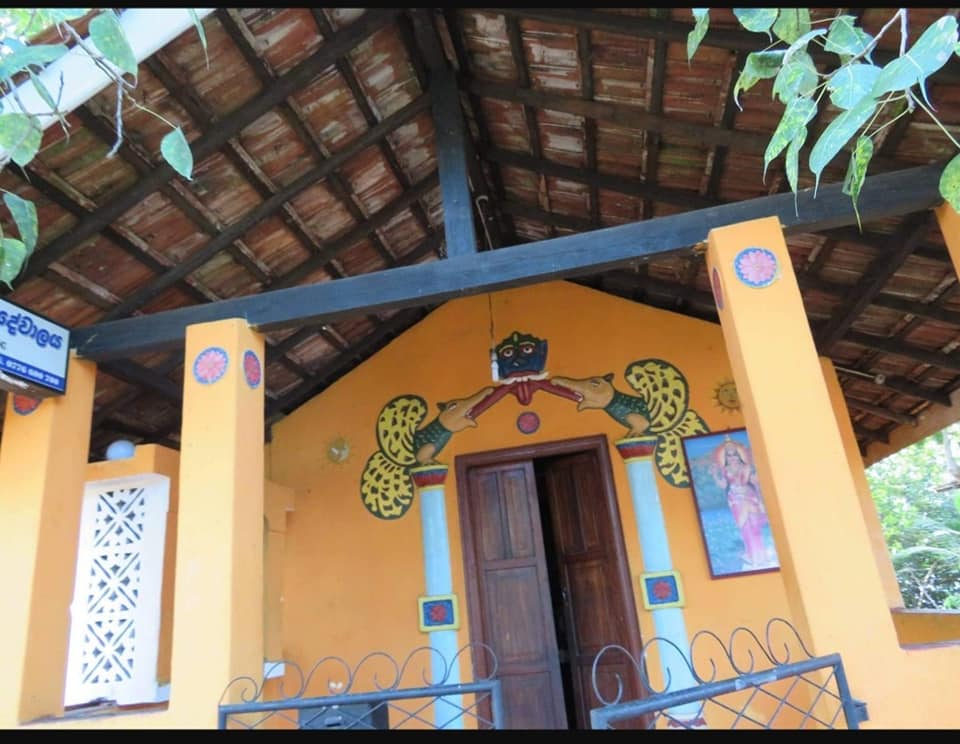
The Gorakapola Pattini Devala
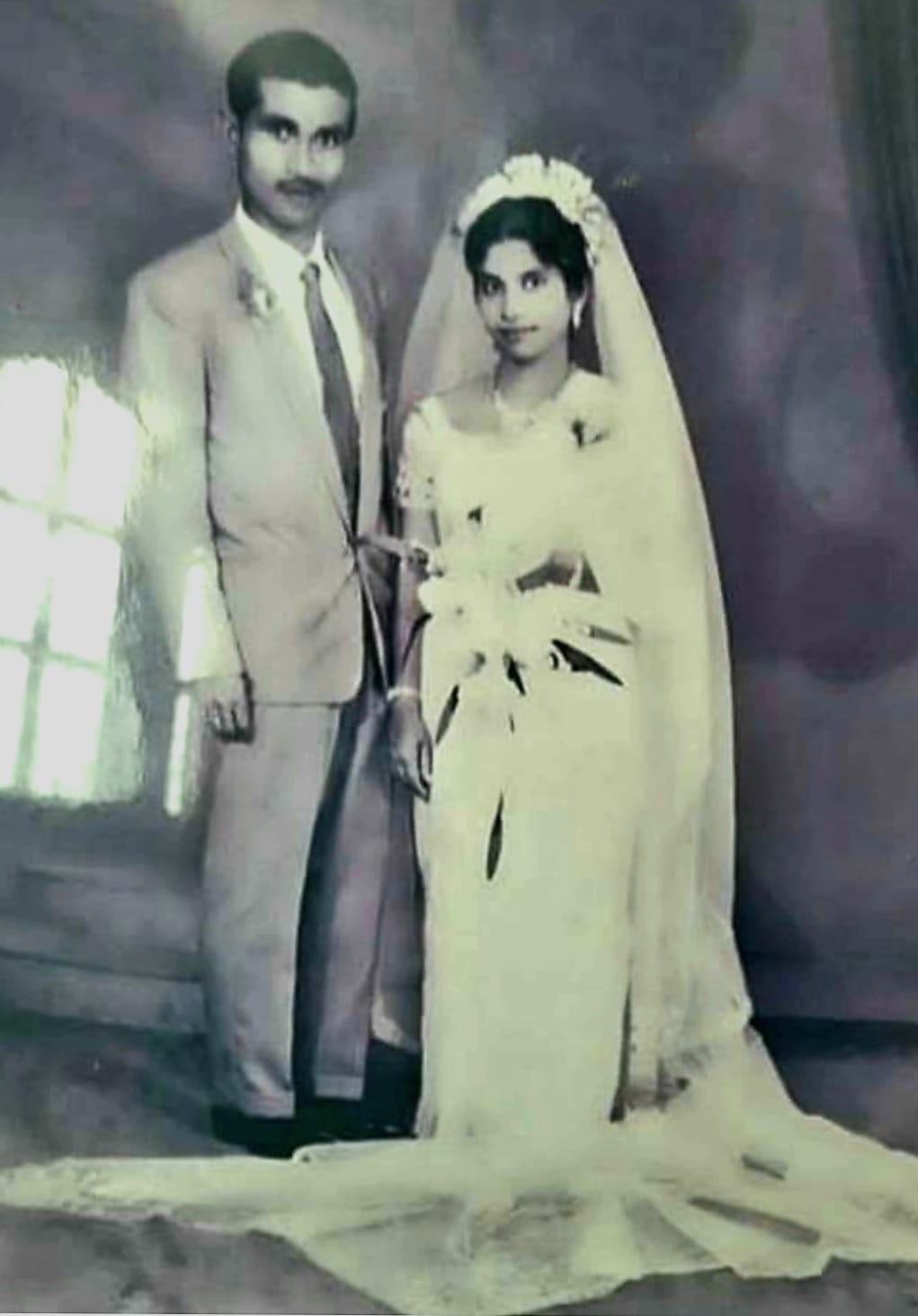
Beminahannedige
Wilmot Reginald Pieris and Padma Amarasuriya in 1961.
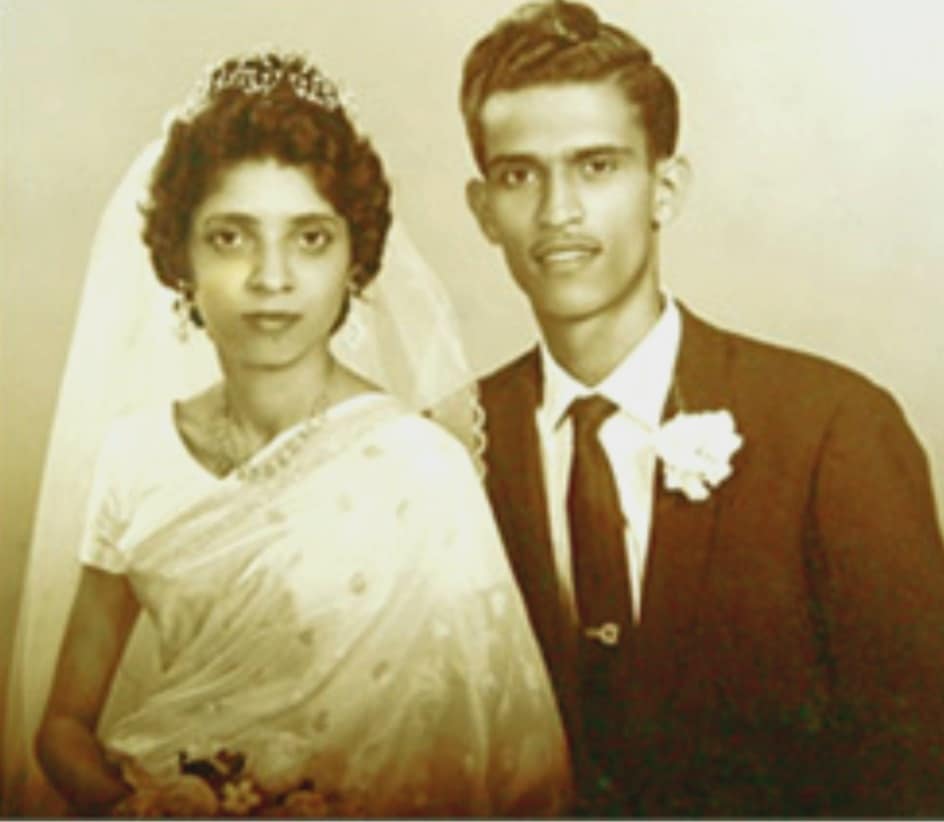
Amara Chitrani Peiris and W. A. Walter
de Silva in 1962.
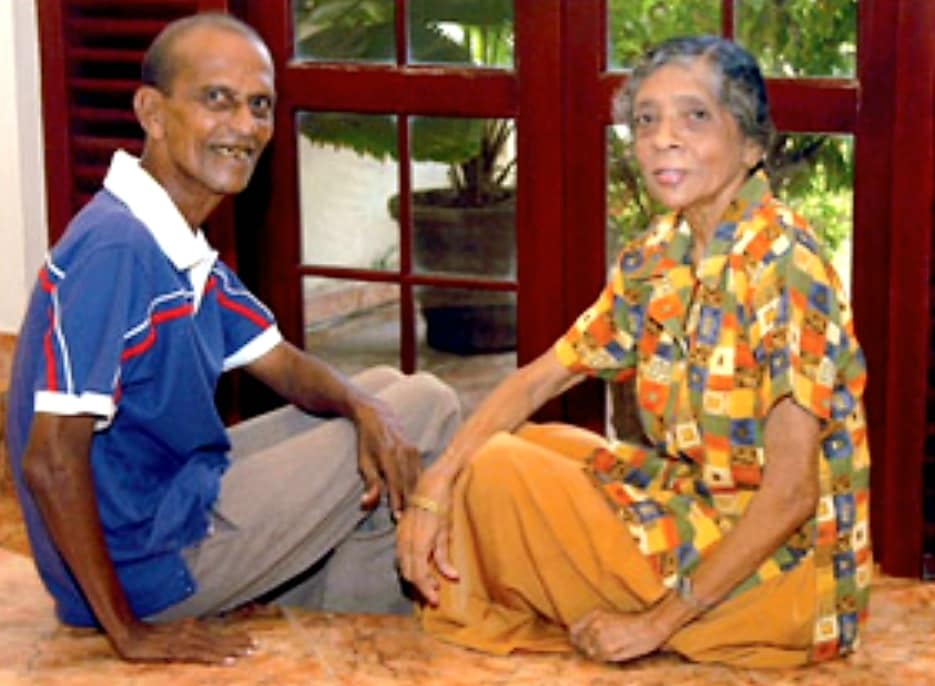
Amara Chitrani Peiris and W. A. Walter
de Silva in 2007.
#######################################
Sunday May 13 2007
Darling we aren't too old, though we pass the Jubilee Gold
 Marriage is said
to be the second birth of human life. "It definitly is," says
Walthota Arachchige Walter Charles de Silva.
Marriage is said
to be the second birth of human life. "It definitly is," says
Walthota Arachchige Walter Charles de Silva.
"I lost my father when I was 3 years old and then my mother died when I was five I was the youngest. It was my elder sister and brother-in-law who looked after me and my four brothers. They also had children. So I do not remember of having the warmth of parental love. I really missed that. It was after I got married I learnt what a family life was," he smiles.
"I lost my father when I was 6 years. But my mother lived until I was 24 years old. However by the time of my wedding she was not living. So somewhat it affected me too though my elder sister didn't let me feel this," joins Bamini Hannadige Amara Chitrani Pieris.
This week our love story begins in a different angle as both this husband and wife value married life as sacred. "He was five years younger to me. I'm a Buddhist and he is a Catholic. But nothing was a barrier to us. Our marriage, just happened. Destiny, just destiny!" says Amara.
Walter was born on October 12, 1938. Edmond de Silva, the first Ceylonese Jockey was his father. Agnus Beatrice de Silva was his mother. Walter was the youngest to Vinifred (his sister, the eldest) and to the four brothers Benni, George and Christie.
|
|
"We stayed at No.82, Thimbirigasyaya Road, Colombo 5. I have a faint remembrance of my father. But what I have gathered from others he had used to go to the race course at 4 am to exercise the horses.
He then used to come back home for breakfast and again go back to the stables which were at Thimbirigasyaya, around where we were staying and stay until dusk. He was the in-charge of the stables there. People still remember the horses walking down the Jawatta Road to the Race Course from the stables," recalls Walter.
"Jockeying was a permanent occupation until 1957. There were three stages in it. The first step was the 'riding boy' in which one could take the horses to the race course from the stable until he got used to handle the horses by observing and familiarising the movements of the horses.
Second stage was the 'apprentice jockey' in which one was given the right to ride down a horse. 'Jockey' was the third stage in which one got the right to train the horses and ride them if the owner allowed.
My father was not a Champion horse rider as there were many foreign Jockeys," reminisces Walter. "On July 3 in 1942 my father died after falling off the horse he was riding. He was training the horse owned by Sir Oliver Gunathilaka, and was on the training track. He died on the spot as this was the fate many Jockeys tend to face during that time," Walter says.
"Sir Oliver Gunathilaka, Commandeering Chief of the Government (before he became the Governor General) was really worried over my father's death. He had bought the plot my father was buried at Kanatta under the name of my mother, and it became our family burial grounds. It said that Sir Oliver had paid about Rs. 8 or 10 for the plot at the cemetery," he says Walter.
Walter's sister Vinifred was just 15 years then. Her love affair with another young Jockey, Henry Young was not a secret to Walter's mother. So she decided to give her in marriage as soon as possible on two reasons, as she wanted to release herself from the burden she had of her pretty young daughter, and then to have a male family member who could support her five sons.
"Henry fed and clothed us, and spent for our education right along. I studied at St. Peter's College, Colombo. However I was exempted of paying school fees as I was the third boy from the same family who went to St. Peter's," says Walter.
"Our brother-in-law, Henry was a strict disciplinarian. We cannot say he was nasty and rude to us all the time, but sometimes went far beyond in disciplining us. He might have wanted to bring us up as the way he was brought up by his father by boarding him at Trinity College, after his mother's death.
Hence he also didn't know the importance of love and care at all," says Walter. He tries to smile, but a dark shadow of anguish seems to have flown across his face. "We rarely had time for any extra curricular activities as we were allocated to do certain jobs at home by our brother-in-law to help out our sister. Henry was always out with his horses and my sister, Winifred was a young mother of three little daughters," recollects Walter.
Their brother-in-law's strict dominance and reign was becoming heinous to the five youth. After tolerating the situation until they passed through the Senior School Certificate exam, the five brothers disappeared from home one by one. "Benni joined the Navy and later became a Jockey. Second brother, George became a Jockey straightaway. Christie, the brother before me found a job as a tea clerk," says Walter.
Walter boy, the last to born to the five was the last to decide to disappear from his sister's place. So he did. Both Jockey elder brothers had no proper place to stay other than somewhere adjoining the stable.
It might have been the painful bitter truth of the parentless children (of any age). Christie was the only hope. So Walter went to stay with him. 'Qickshaws', the first ever taxi service in Sri Lanka owned by Vere de Mel (who later became the first Chairman of CTB) provided him the first ever green light in life. He joined 'Quickshaws' as a roster clerk.
The courage to come up in life however gave energy to Walter. Loneliness makes human beings feel miserable and disgusted of life. Young Walter was also living with these feelings from time to time, especially when he saw loving family units of his friends.
That was something that was lacking in his life throughout. There was hardly anybody who took care of him. He was in a nobody's land! However he was facing life as it was. He followed a course in book keeping. He was courageous.
He became an Accounts clerk at Associated Motorways Tyre Re-building factory. After working nine months there, Pure Beverages Company opened its gates for Walter with many hopes.
His first salary at his new place was Rs. 178.35. He still remembered how he spent it carefully on his monthly boarding fee - Rs. 75 with morning tea and dinner, his weekly laundry and Rs. 2 for his monthly hair cut. "I could save only about Rs. 5 or 10 per month. However I never missed any over time hour and could gain extra Rs. 60-70 by covering 40 hours OT.," he grins.
Walter had relatives, but hardly visited them. But he enjoyed going to the parties at friends' places. It was the only outing he had other than going to the office. He liked his office crowd. Amara was one of them. Still she was just a colleague of his.
Amara was born on December 11 in 1933 to Arnold Pieris, a landed proprietor and Yasodara Sudhirikku Jayawickrema. Amara and her twin sister Amitha were the youngest of 11 children in the family.
After studying up to the Senior School Certificate exam at Our Lady of Victories, Moratuwa, Amara had a leisure time at home with her twin. After the death of her mother, it was Amara's elder sister and her husband who took charge of the youngest twin siblings. Both followed a Stenography course as they felt they should be independent. Amara found a job as a scenographer at Pure Beverages.
Both Walter and Amara were in the same staff. Both were parentless. Both were heart broken over their first love affair. Everybody seemed to be going for 31st night dances with their partners.
Walter was bewildered. Some sad feeling was pricking somewhere at the deep corner of his heart. He didn't know whom to invite to come with him. Finally he asked the telephone operator of the place who was also a good friend of his, to find a partner for him. "Shall I ask Amara?" asked the telephone operator. "Hmmm... Ok," he said casually.
When Amara also said 'ok' he bought two tickets for the dance at Little Hut at Grand Hotel, Mount Lavinia (today Mount Lavinia Hotel). They went together, danced and when the new year fell he kissed her and wished her 'happy new year' for 1962, not knowing it was the year that was going to turn a new leaf in their lives.
Walter dropped her at her place at Egoda Uyana, Moratuwa and went back to his boarding place at Mount Lavinia. He found this new boarding place as he wanted to get rid of his past memories, especially of his first love... But now Amara seemed to be floating in his mind. "She is good, friendly and kind hearted," he thought.
Subsequently Walter invited Amara for a show at Liberty. Amara who was also trying to cure the pain of the wound she had in her heart over her broken first love felt happy and contended with Walter though he was younger to her and different in religion.
Both were at the Kollupitiya railway station waiting for the train after the show. Walter looked at her. The train was moving towards the station. Everybody was getting ready to get in. "I love you," he said. Amara stared at him for a moment and then shook her head.
"She only shook her head, and didn't know whether she said 'yes or 'no'. But I took it as 'yes'," laughs Walter.
They entered married life on December 12 in 1963 under the shower of everybody's blessings. Neither Poruwa ceremony nor church mass was held. Instead normal registration with a beautiful reception was held at the Grand Hotel, Mount Lavinia with 500 guests.
"None of my brothers invited my sister's family when they got married. But I did. And all of them including my brother-in-law came to my wedding. Except Christies, the brother before me. He was the only person who didn't come. I still don't know why," he says. Dhammika Fernando, Managing Director, Pure Beverages and H.W. Amarasuriya, landed proprietor were their attesting witnesses.
The lonely two hearts were not lonely anymore. Soon they were blessed with a daughter and a son. Walter and Amara built their own nest without bothering anybody.
"All the four of us - including our daughter and son worked at Pure Beverages. Our son is still there for the past 25 years. And our daughter is staying in London. Both are married and we live with the assistance of our children since we don't have a pension though we have worked for nearly 40 years," says Amara.
"We are contended. The only message we can give to others is to live according to the means you have without giving any trouble to others. And be faithful to your partner," concludes the Walter couple.
#########################